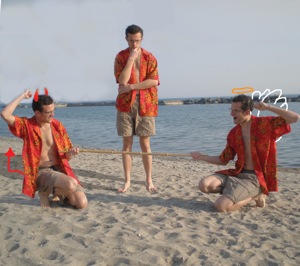
Limbo is a confessional monologue by a British Columbian man named Andrew Bailey. At the very beginning, he tells us what the meaning of life is. Then, as he experiences more in his life, he quickly realizes he is wrong.
Bailey is a nerdy fellow who delivers his one-man show with a sort of Woody Allen neuroticism. While he doesn’t completely change into different characters, he creates impressions of them through his imitations. With a spotlight, a chair and a table, he brings us, the audience, into his world and his memories.
His incredulous stories seem hard to believe but may very well be true. I don’t want to give too much away by stating what he is afraid of in life and what he is looking for, but I will say that he battles with his thoughts and his identity.
Religion and morality are mentioned in the dialogue, but the audience is not preached to. These various topics merely play a role in his life, and he shares that with us.
The dialogue is funny for a standard one-man-show. He stays light, never going too deep to make the audience groan with Philosophy 101. He also vocalizes his awareness of his monologue’s limitations, which moves him and his audience closer together.
For anyone who has ever had even a passing interest in philosophy and the meaning of life – this is a show for you to go and see.
Details
Limbo
Director: Britt Small
Cast: Andrew Bailey
Genre: Comedy, Drama
Warning: Mature Language, Audience Participation
Venue 5 The Solo Room (at the Randolph Academy), 736 Bathurst Street.
55 min.
Fri, July 8 6:30 PM
Sat, July 9 3:15 PM
Sun, July 10 6:15 PM
Mon, July 11 4:00 PM
Wed, July 13 10:00 PM
Fri, July 15 7:00 PM
Sat, July 16 6:15 PM
Sun, July 17 12:30 PM

Enjoyed the show. I think the reviewer nailed it. Bailey held my attention well. Although the glare of the chair was occasionally distracting.
I enjoyed the show very much! I am very curious to know the name of the song that is played at the beginning of the play.